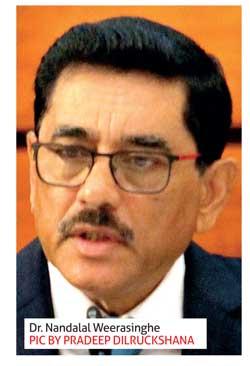Reply To:
Name - Reply Comment
By Nishel Fernando
Amid growing hyperinflation concerns, the Monetary Board of the Central Bank (CB) jacked up the policy interest rates by 100 basis points after a bumper 700 basis point hike in April.
 The Monetary Board of the CB at its meeting held on Wednesday decided to increase the Standing Deposit Facility Rate (SDFR) and the Standing Lending Facility Rate (SLFR) by 100 basis points to 14.50 percent and 15.50 percent, respectively.
The Monetary Board of the CB at its meeting held on Wednesday decided to increase the Standing Deposit Facility Rate (SDFR) and the Standing Lending Facility Rate (SLFR) by 100 basis points to 14.50 percent and 15.50 percent, respectively.
With the inflation is projected to shoot up to 70 percent over the next couple of months, CB Governor Dr. Nandalal Weerasinghe outlined that the main concern of the CB is to avert a hyperinflation scenario despite the rising finance cost.
“If the inflation rate goes beyond 100 percent, we will go into hyperinflation. In such an environment, no one would be able conduct businesses while the poor would fall further into poverty. That’s why we are focused on containing inflation, although, it will increase the finance cost,” he said.
In June, CCPI-based headline inflation and core inflation accelerated by 54.6 percent and 39.9 percent, respectively.
The CB is projecting a significant deceleration in headline inflation from beginning of next year with the normalisation of the world commodity markets as well as the subdued aggregate demand as a result of the monetary and fiscal measures taken.
However, the CB expressed concerns due to delays in the implementation of fiscal consolidation measures by the government.
“…the remedial policy measures adopted by the Central Bank need to be complemented by timely and appropriate policy adjustments by the government, including the need for the expeditious implementation of fiscal consolidation measures, alongside efficient and effective social welfare programmes to support the vulnerable groups of the society,” CB said.
Despite a marked slowdown in private credit in response to rising interest rates, Weerasinghe noted that credit to the government has continued to increase indicating a lack of progress in fiscal consolidation measures.
The CB stressed that coordinated monetary and fiscal measures along with State-owned Enterprise (SOE) reforms are required to overcome the on-going crisis. “Faster implementation of expected fiscal reforms aimed at strengthening government revenue mobilisation and expenditure rationalisation is needed to reinforce fiscal consolidation efforts, including the expected improvements in the financial position of State-owned business enterprises. Such adjustment in fiscal sector performance would result in a decline in gross financing needs of the government in the period ahead, and help scale down monetary financing at a faster pace,” CB said.